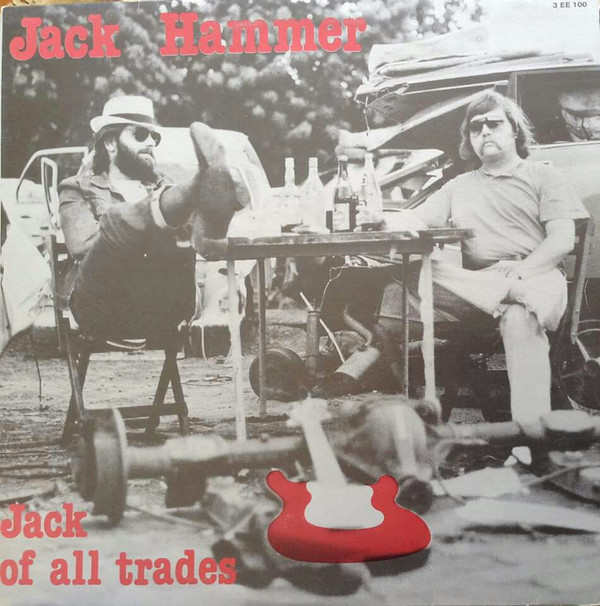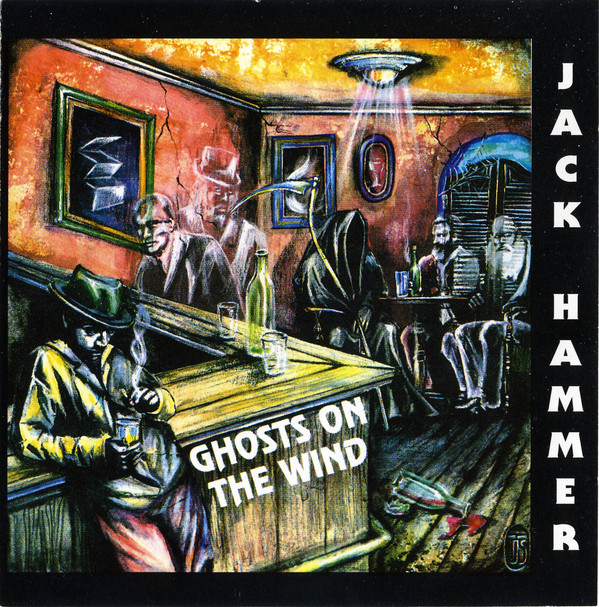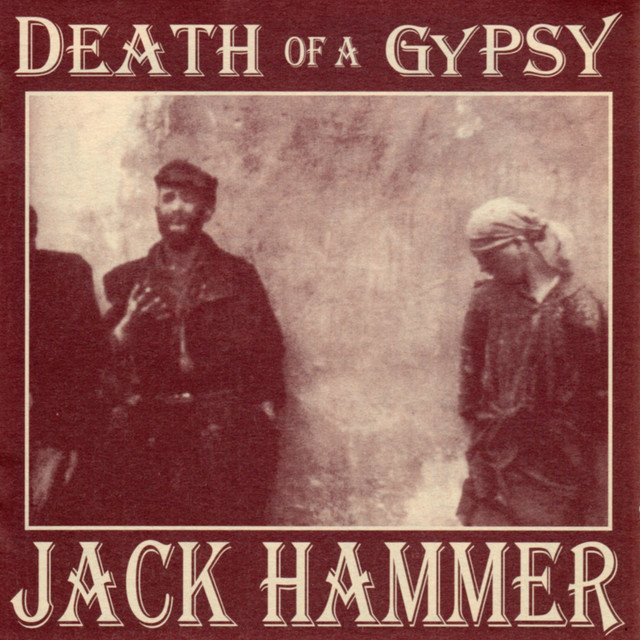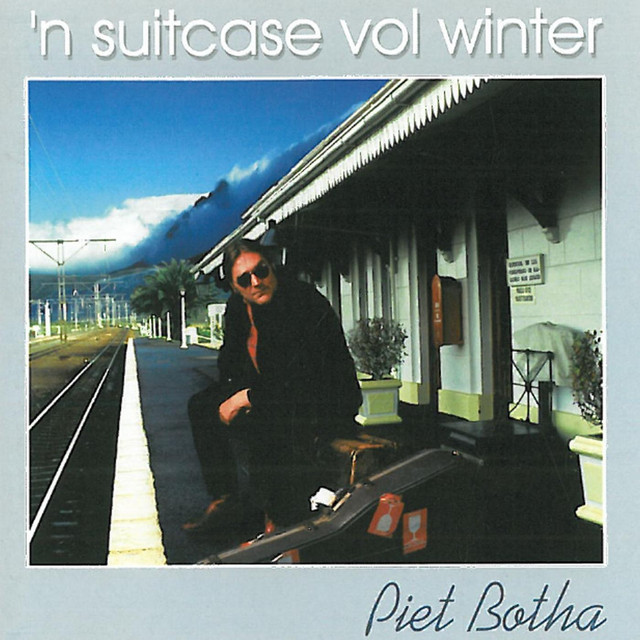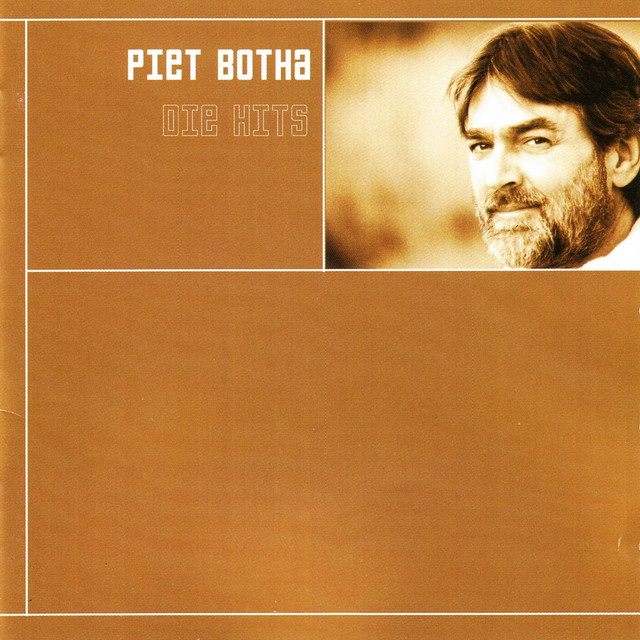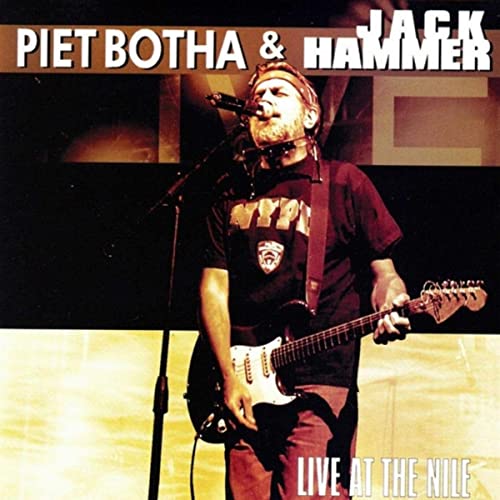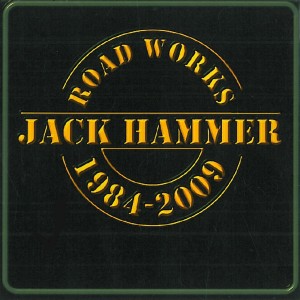
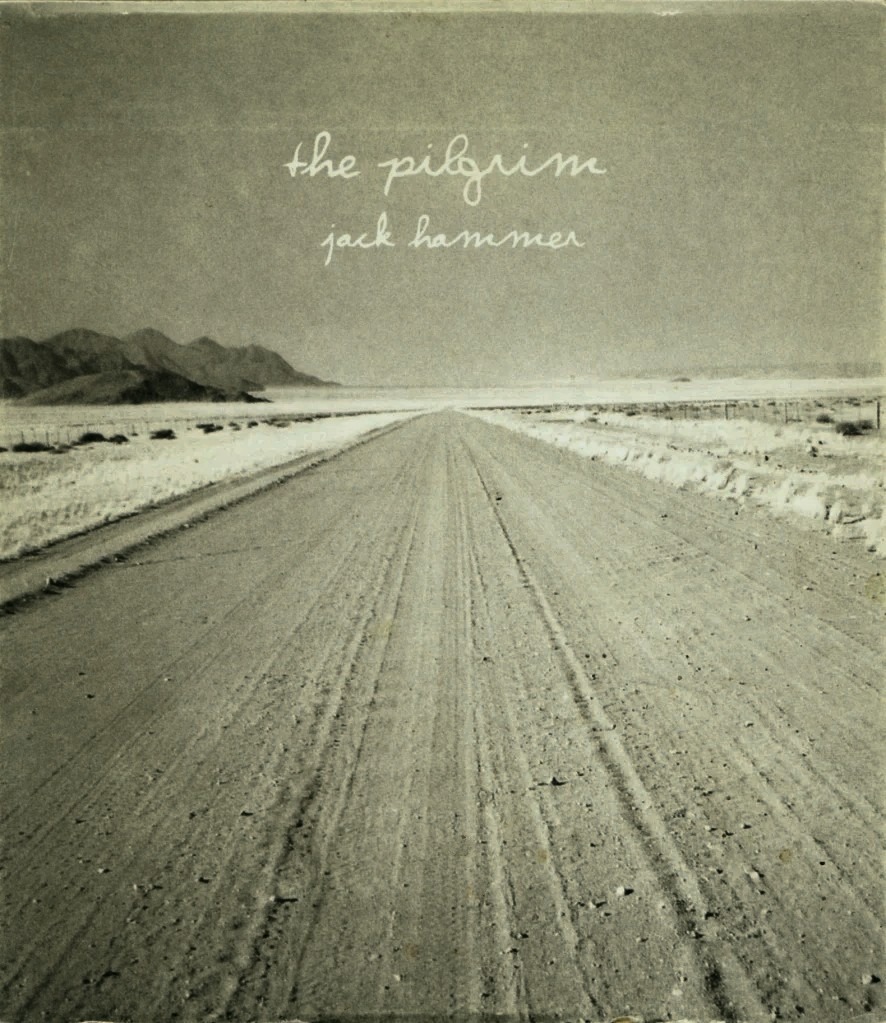
Tracks
- G8
- The Pilgrim
- Headlines
- Morrison Hotel
- Lady Amber
- Rock Steady (with Tidal Waves)
- Russian And Chips (Freedoms Children) see synopsis below
- Bury Me When
- Mozambique
- Tribal Fence (Freedoms Children)
All songs written by JP Botha except 1, 3 by JP Botha / JS Martin and 7 & 10 by Ramsay Mackay.
Session tracks
Musicians
Piet “Hammer” Botha: Vocals, guitars, organ, piano, harmonica
Johnathan “The Kid” Martin: Vocals, guitars, cello
Tertius “Bean” du Plessis: Bass
Paul “Duke” van de Waal: Drums
And featuring
Siya Makuzeni: vocals, trombone
Eddie Schutte: trombone
Jacob “Zakes” Wulana: vocals and also piano, organ and guitar on ‘Rock Steady’
Samuel “Drumbo” Shoai: vocals and drums on ‘Rock Steady’.
Recorded, mixed, mastered and produced by Lanie van der Walt at Wolmer Studios, May 2004.
Release information
CD: April 2005, Wolmer Records, F1000408 (distributed by Bowline)
CD: 2015, Independent. Remastered by Lanie van der Walt at Wolmer Studios.
Comments
‘G8’, ‘Headlines’ and ‘Russian & Chips’ were originally recorded live in February 2003, and released on Live At The Nile in July 2004.
‘Mozambique’ and ‘Morrison Hotel’ were re-recorded in February 2006 and released on the TuksFM Sessions EP CD.
A Synopsis
The stories behind the songs
by Piet Botha, 2005
1. G8 … a song that we have played for a year or two .. a kind of apocalyptic view of world politics .. middle east .. globalization … the destruction of nature and the ozone etc .. Johnathan came with the intro and verse and we took it further to the chorus and the concept … the strange thing is that the song became more relevant as time went by … and today it is more relevant than ever … .
2. The Pilgrim … a completely different intro … the chorus singers are Siya Makuzeni, Jacob Wulana and Samuel Shoai. Jacob and Sam are members of the reggae band “Tidal Waves” with whom I have had the honour of sharing gigs with … Siya is a very young “find” and was introduced to us by Lanie (v.d. Walt) she had been one of his students at the Pretoria Technikon .. the story is about a traveller who has to make certain decisions at a turning point on his journey … and also reminisces about the road so far ..
The Zulu words at the end are the same as the English … “We have travelled so far, with the sun behind us, but our journey has just begun … “
3 Headlines .. also a song we have been playing live for at least a 2–3 year timeframe … based on true circumstances .. a possible indictment of the sensational nature of newspapers … Again Johnathan brought the intro, verse and basic idea .. we just took it a bit further and there we were …
4 Morrison Hotel … A blues song in the minor scale (E minor) … the story is about a person looking for the ghost of Jim Morrison, driving away on freeways filled with memories and images of a forgotten time .. when rock and roll was filled with magic and uncertainty … long guitar solos meant to be that way … we deliberately tried to get the Doors organ sound (the riff in the intro that keeps returning) ..
This song, written by Piet Botha, takes its title from The Doors album of the same name, and refers to a fruitless search for Jim Morrison. It is not a cover version however, as The Doors never actually recorded a song with this title.
— Brian Currin
‘Morrison Hotel’ was re-recorded in early February 2006 at TuksFM featuring new guitarist Tonie van der Walt and released on the ‘TuksFM Sessions’ CD in February 2006.
— Brian Currin, March 2006
5 Lady Amber … The dangerous nature of addiction … be it to love, whiskey or woman … why all despair has a female persona … “the femme fatale” in her worst manifestation … the one you have to leave or else you will surely die … bit of a pop chorus … but the nature of the song does save it from commercial overtones …
6 Rock Steady … on this track we used Jacob and Sam to play Drums, Bass, Piano and Organ … as well as singing … Hammer played the guitar and sang the lead vocal … a song about the music industry, about extreme capitalism, the solution to stay true to the nature of real music i.e. Rock Steady … what will be will be …
7 Russian and Chips … originally titled “The Kid He Came From Nazareth” from the album “Astra” by S.A. band Freedoms Children (1970) .. the song evolved on the Wildebeest album “Bushrock 1” to the new title being a blend of traditional Russian “jig” violin and the hard rock ballad thrown together .. probably one of Jack Hammer’s all time favourite live tunes …
One of Ramsay MacKay’s great songs, adapted way back in 1981 on the Wildebeest album “Bushrock 1” … the late Dave Tarr put in the Russian piece on violin … I just transposed it to guitar many years later …
The Kid He Came From Hazareth (or should that be Nazareth?)
When we first recorded this song, it was called ‘The Kid That Came From Nazareth’. When the album ‘Astra’ was submitted to the SABC (Old Regime) for their playlist, they banned the album because of that track, as it was “Blasphemous“. They said that if we changed all references to the word “Nazareth” including the recording, they would unban the album. So it was back to the studio and a re-recording of the lyrics as well as re-doing all the artwork. This was quite standard practice in those days.
— Julian Laxton, January 2001
8 Bury me when … a new song … also very socially conscious in content … i.e. “what did you do for your brother today ?” .. basic protest against extreme Capitalism .. and the added mystical element portraying burial traditions in ancient times … Earth and Fire and Rain and Sky … man has lost touch with Nature, with the Earth Mother …
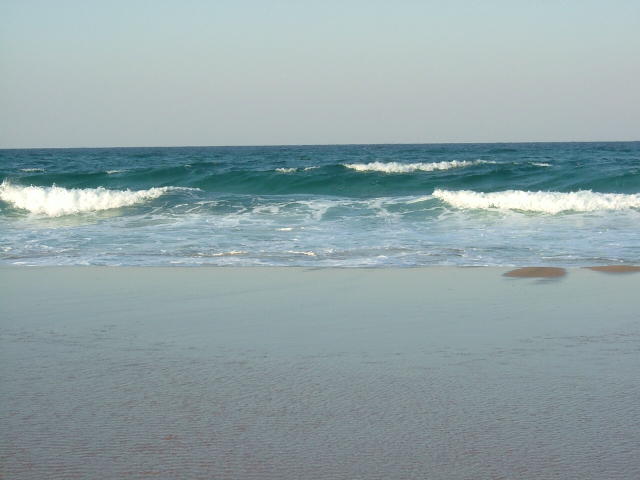
9. Mozambique … the garden of eden … raped and plundered be the white man and catholic colonial devils for centuries .. land of wonder … and great musicians .. the last chorus is a piece for Gito Baloyi … “I often think about you Gito .. when I walk barefoot on the sand … we must get back to the Garden … “
‘Mozambique’ was re-recorded in early February 2006 at TuksFM featuring new guitarist Tonie van der Walt and released on the ‘TuksFM Sessions’ CD in February 2006.
— Brian Currin, March 2006
10. Tribal Fence … Another song from the Freedoms Children album “Astra” (1970). Basically a tribute to the poetry and songwriting of Ramsay Mackay and the great band that was Freedoms Children ..
The lovely “different” harmonies and textures were all put forward and implemented by our producer and brother Lanie v.d. Walt, .. and also the mix which I think is very unique … and so we travel on …
Reviews
One of the finest rock albums to come out of this country in years is Jack Hammer’s “The Pilgrim”. A landmark album for the perennial blues rockers “The Pilgrim” is right on the money: production, songs and performance all come together to make one of my fave albums of the moment. Take a listen to “Headlines”, “G8” and Piet Botha’s stunning interpretation of the Freedom’s Children gem “Tribal Fence” … a must for any true blue rock fan!
— Benjy Mudie, Rock Of Ages, May 2005
… listen to ‘The Pilgrim’, the band’s latest CD, and it’ll blow you away. Real rock music, with influences of Dire Straits (when ‘Morrison Hotel’ started, I thought I was hearing Mark Knopfler), and the title track, ‘The Pilgrim’ – shades of ‘Knocking on Heaven’s Door’.
— Peta Lee, The Independent On Saturday, 30th April 2005
Celebrating Jack Hammer’s 21st anniversary, veteran blues rock general Piet Botha guides his band of brothers beyond the valley of “boere” blues and into the realms of 70’s power rock protest song (“G8”) and progressive rock anthems (“The Pilgrim”) that map the psychic migration away from decaying inner city ruminations (“Headline”).
With Botha threading his basement blues rasp through road movie postcards (“Morrison Hotel”), hook-driven power ballads (“Lady Amber”) and skanking reggae rock daydreams (“Rock Steady” with Tidal Waves), Jack Hammer’s blistered jukebox blues highway chases (“Russian ‘n Chips”) reach their destination way beyond any operatic rock trek mentality (“Tribal Fence”).
— CD Wherehouse, April 2005
Jack Hammer – The Pilgrim
by Toast Coetzer, iAfrica.com, 14th June 2005
This CD begins on the outside, for sleeve design (and execution thereof) like this is something we seldom see on local releases. It costs plenty of money to print like this – in design biz they call it a digi-pack, which is basically just the cardboard CD cover and holder, instead of the plastic thing. Whatever, it looks stunning. All sepia-toned black and white imagery shot in Namibia, it resembles a string of postcards written from the desert, with the lyrics printed on the back.
It’s a worthy jacket for a brilliant album, old stalwart Jack Hammer’s first studio album since 1996.
‘G8’ kicks it into being, simultaneously a powerful musical and political statement:
“There’s a leader on the run
He’s got your soul to pay
And he just jumped on a plane
And he doesn’t care about your pain
Oh no … “
While the tempo is varied throughout – with the chin-up reggae of ‘Rock Steady’ and slow numbers such as ‘Morrison Hotel’ – the intensity never wavers. Another thing that continues to astonish is Piet Botha’s skill with lyrics. What initially seems sparse and conversational gradually reveals textured layers, much like the many thousands of kilometres of road this band tramples every year in pursuit of gigs.
This landscape – which starts explicitly on the cover, with a lonely road stretching towards the horizon – is cultivated throughout as the new Africa we know, the one we can reach in our 4x4s, Mozambique, Namibia, Zanzibar (on ‘Bury Me When’ the place where Botha wants to be buried, “and the tide can do the rest”) – and where we can continuously escape to in our dreams.
Jack Hammer deserves credit for taking their style of music – unapologetic rock – and moulding it seamlessly, and to the benefit of both, with the continent they live in. It’s a matter of the medium soaking up the messages in its immediate vicinity, instead of a dreamscape-America, a faroff place that this kind of rock is often bothered with.
“We’ve travelled so far with the sun behind us/ but our journey has just begun”, Piet sings on the title track, and you know he means it. During, before and after the recording of this album, the band also went through some trauma, which ended in long-time guitarist (and co-author of several classic ‘Hammer numbers) Johnathan Martin leaving the band. Knowing this makes a certain resilience become evident in the music displayed here.
Jack Hammer has been with us since the 1980s and while they might fear to “come home in the headlines” (‘Headlines’), one feels they might return even from that.
Oeg, if you’re looking for a tough-love lovesong, look no further than ‘Lady Amber’ (I suppose by implication, the possibility exists that she might trap you):
“Your love is just like poison / … /
It goes into my veins in my blood
In my heart in my soul”
And it ends with a harsh backhand: “But that is all I recall and the rest is just best left unsaid.” Taai, manne.
‘Russian and Chips’ is one of two Freedom’s Children numbers on the album, featuring a blinding intro of guitars firing at full throttle. To be more precise, ‘Russian and Chips’ is an interpretation of Freedom’s Children’s tune ‘The Kid He Came From Hazareth’, with some random Russian folk tune thrown into the mix – first performed in this fashion by Botha’s early 80s group, Wildebeest.
Lanie van der Walt’s production is exemplary throughout, one even suspects he had a hand in the prog-like intro to ‘The Pilgrim’, where guitar, piano and Paul van de Waal’s drums follow an unusual rhythm before the vocals, backing vocals included, suddenly crashes into being.
‘Tribal Fence’ is the other Freedom’s Children (both are available on the FC album Astra, released in 1970, but now available on CD from Fresh Music) cover and brings this album to a rousing close.
It again features interesting production work – you’ll either love or hate the vocoder voice effects and that milling sound of looped/FXed organ (I think – either way, it annoyed my ear a bit) which builds and builds until the song spirals to a halt.
My favourite track is ‘Mozambique’, a beautiful praise-song to our neighbour, clearly a place which, like Namibia, Jack Hammer feels at home in: “Far from the black city/ where the dragon wants your soul”. It’s boosted by soulful backing vocals and the mention of “Gito”, which one can only assume refers to legendary Mozambican bassist Gito Baloi, who was killed in Joburg last year.
This is big, open-book music for fans of finely distilled rock music which stands as Jack Hammer’s best work to date, or damn near close to it. If they take another decade to make the next album and it’s as good as this, then we should thank them for being such perfectionists.
Hats off to the Hammer.
Discography
